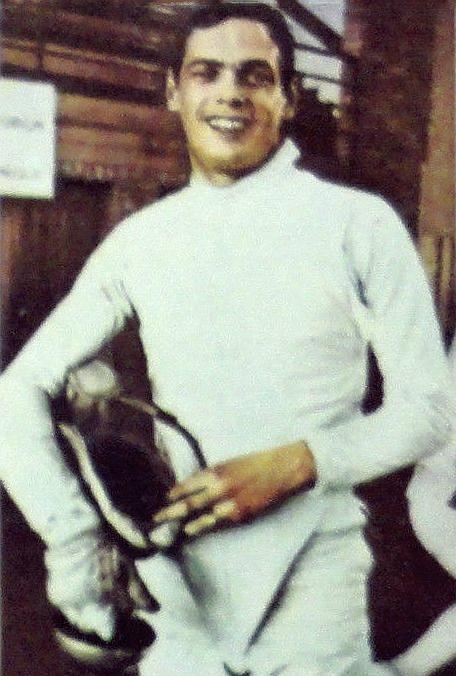1. Life
Győző Kulcsár's life journey began in Hungary, where he spent his early years before embarking on a distinguished career in fencing that would see him become one of Hungary's most celebrated athletes and coaches.
1.1. Birth and early life
Győző Kulcsár was born on October 18, 1940, in Budapest, which was then part of the Kingdom of Hungary. Details of his family background and childhood environment are not extensively documented, but his early life in Budapest laid the foundation for his future in sports.
1.2. Education
Information regarding Győző Kulcsár's formal and informal educational experiences, as well as any influential teachers or mentors during his formative years, is not available in the provided sources.
1.3. Early career
Kulcsár began his fencing career, focusing on the épée discipline. While specific details of his initial competitive activities are not provided, his early steps in the sport quickly led him to prominence, setting the stage for his remarkable achievements on the international stage.
2. Competitive career
Győző Kulcsár's competitive career was marked by exceptional achievements, particularly in the Olympic Games and World Fencing Championships, where he consistently demonstrated his prowess in épée fencing.
2.1. Olympic career
Kulcsár competed in four consecutive Olympic Games, showcasing his talent in both individual and team épée events. He accumulated an impressive total of six Olympic medals. At the 1964 Tokyo Olympics, he won his first gold medal in the men's team épée event. He continued his success at the 1968 Mexico City Olympics, where he secured two gold medals: one in the men's individual épée and another in the men's team épée. At the 1972 Munich Olympics, Kulcsár added another team gold medal to his collection, along with an individual bronze medal. His final Olympic appearance was at the 1976 Montreal Olympics, where he earned an individual bronze medal.
The table below summarizes his Olympic medal achievements:
| Year | Host City | Event | Medal |
|---|---|---|---|
| 1964 | Tokyo | Épée team | Gold |
| 1968 | Mexico City | Épée individual | Gold |
| 1968 | Mexico City | Épée team | Gold |
| 1972 | Munich | Épée team | Gold |
| 1972 | Munich | Épée individual | Bronze |
| 1976 | Montreal | Épée individual | Bronze |
2.2. World Championship success
Beyond his Olympic triumphs, Győző Kulcsár also achieved significant success at the World Fencing Championships. He was a key member of the Hungarian team that won three gold medals in the team épée event. These world titles were secured in 1970, 1971, and 1978, further cementing his status as one of the sport's most dominant figures.

3. Coaching career
After concluding his illustrious competitive career, Győző Kulcsár dedicated himself to coaching, where he continued to contribute significantly to the sport of fencing by nurturing new talent and shaping future champions.
3.1. Coaching activities and notable trainees
Kulcsár transitioned into coaching around 1980, initially working in his home country, Hungary, from approximately 1980 to 1988. He then moved to Italy, where he coached from around 1988 to 2000. Following his tenure in Italy, he returned to Hungary, resuming his coaching activities there after 2001. Throughout his coaching career, Kulcsár mentored numerous prominent athletes who went on to achieve international success. Among his notable trainees are Tímea Nagy and Emese Szász, both of whom became Olympic gold medalists in women's épée. His nephew, Krisztián Kulcsár, also trained under him and achieved significant success in fencing.
4. Personal life
Győző Kulcsár's personal life included his physical attributes and his association with a prominent fencing club. He stood at 6.2 ft (1.88 m) tall and weighed 174 lb (79 kg). During his competitive years, he was affiliated with the OSC club in Budapest. Details regarding his family, marriage, or specific personal interests outside of fencing are not widely documented.
5. Death
Győző Kulcsár passed away on September 19, 2018, at the age of 77. His death marked the end of an era for Hungarian and international fencing, prompting reflections on his profound impact on the sport.
6. Legacy and assessment
Győző Kulcsár's career is widely regarded as one of the most impactful in the history of fencing, characterized by both his extraordinary athletic achievements and his subsequent dedication to developing new talent.
6.1. Positive contributions
Kulcsár's most significant contributions to fencing stem from his remarkable success as an athlete. His four Olympic gold medals and three World Championship team titles established him as a dominant force in épée fencing during his era. Beyond his competitive prowess, his transition to coaching allowed him to extend his influence. He played a crucial role in developing future talent, guiding athletes like Tímea Nagy and Emese Szász to Olympic glory. His ability to excel both on the strip and in the coaching box highlights his deep understanding of the sport and his commitment to its growth.
6.2. Influence on future generations
Győző Kulcsár's career served as an inspiration for subsequent generations of fencers. As a champion, he set high standards for performance and dedication. As a coach, he imparted his vast knowledge and experience, shaping the techniques and mental fortitude of his trainees. His methods and achievements have left an indelible mark on Hungarian fencing, contributing to its continued strength on the international stage. His legacy is not only defined by the medals he won but also by the champions he helped create, solidifying his position as a pivotal figure in the sport's history.